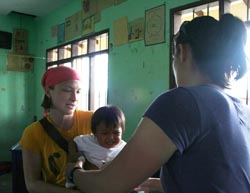Medicine grad hopes to travel the world in the name of health
Doctor of medicine
| After graduation, some students may choose to celebrate their achievement by traveling to other countries for a relaxing vacation. But not Zoe Maher. She’s certainly a traveler — just not a vacationer.
The Sea Isle City, N.J., native has already been to other parts of the country and abroad in her four years at the School of Medicine to provide people in rural areas with the basic medical services needed to survive. Her efforts culminated in the fall with the formation of the Temple Emergency Action Corps* (TEAC), an organization designed to train medical students in disaster response and enable them to provide basic medical and humanitarian aid in disaster sites around the world. Now, as she prepares to graduate with her medical degree and begin her surgical residency at Temple, she hopes to work on setting up an international medicine elective so that others can benefit from what she calls “a global view of community medicine.” |
 Photo courtesy Zoe Maher
As a founder of the Temple Emergency Action Corps, med school graduate Zoe Maher (above, left) recently spent time in Bolivia to provide basic medical care to rural communities. Here, she helps care for the child of a patient outside El Puente, Bolivia.
|
|
“The issue of healthcare disparity has always been on my radar, and I wanted to see it from a perspective other than my own,” Maher said. “I believe that traveling to areas of disaster allows you to better see patients as complete people, and to recognize how the challenges people face outside their doctors’ offices can affect their healthcare.” As an undergrad at New York University, Maher chose pre-med as one of her paths in individualized studies, in which she has a bachelor’s degree. But her interest in the impact of healthcare access stemmed from her work in a New Orleans public school. She taught middle school science for two years before coming to Temple to pursue her medical degree. I saw a lot of health disparities,” Maher said. “But more than that, I saw educational disparity, and it got me thinking about the way that limited access to education can impact a life. When I came to medical school I was already thinking about the parallel way in which limited access to healthcare can do the same. I wanted to get involved in creating a more level playing field for patients affected by this.” Through TEAC, she and fellow med students hope to do just that. Most recently, she led a team to Bolivia to provide basic medical care to more than 1,000 people in a rural village outside of La Paz. “People were thanking us for treating them for really basic things,” Maher said. “We helped get potable water to many families, and provided people with treatments for conditions that in the United States would never be as far advanced. It was empowering to have that kind of impact.” Maher said she thinks this type of outreach is especially helpful for first- and second-year medical students, who, as she put it, “can use a trip like this as their welcome into medicine.” “We took students from all years of their medical training to Bolivia. The first- and second-year students were able to bond with their older peers and get a powerful hands-on learning experience.” Maher said that while her ambition has always been to help others, she needed the help of Temple faculty to get TEAC off the ground. “The faculty is great at encouraging students to take the first steps to conceptualize their ideas and go through the proper channels to get results,” she said. “Before coming to Temple, I had never put together a grant proposal or set up a program like TEAC. I think it would be much less likely that I would have done this if I’d gone to another school.” She hopes to become one of those influential faculty members someday, blending her teaching experience with her knowledge of medicine to guide future medical students. “It would be great to ‘retire’ into a professorship,” she said. “I’d be ecstatic to come back to Temple as an educator.” All of this lends itself to her drive to help others. “Helping other people feels really good,” she said. “Once you help someone it becomes infectious, spreading from that person to the next and the next. And once you experience that, my hope is that you will never stop. “That’s what it’s done for me, and that’s what I want other people to see.” *Funding for the Temple Emergency Action Corps is provided by a grant from the Greenfield Foundation. |
|